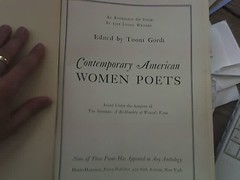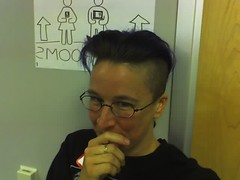I was prepared to talk during the Bloggercon “Bridges” panel but not quite for Elisa’s question of “Are we ready for men to be allowed on BlogHer panels?” I didn’t even know where to start. I mean, “What? No! Are you kidding? Maybe after the patriarchy’s smashed…” And then kind of in frustration I said something like “What the heck. What man would want to, why would a guy want to come into one of the very few women’s spaces that is set up for women to talk and listen to each other and for women to figure out what it is that they want to do as women, and demand that women listen to them? WTF, men? ” Apparently that was shocking and controversial. Obviously, I am not a separatist. But I am a fuzzy separatist. That is to say, I believe strongly that where there are unequal power dynamics *overall in society* then it is quite valuable to have identity-based conversations – because different conversations happen when you do. Then, the people having that conversation get a sort of base of power, of validation, of figuring-out. You get somewhere new. I believe very strongly as well that you then need to communicate outside that focus group. thus the “bridges”.
This is a pretty complicated topic… I think sometimes it takes trying it to see the point of it, and to see what use it can be! Think of it as a thought experiment and as something that has to be both ongoing and temporary.
When you get a group of women with computers and blogs together, what do they talk about? What’s important to them? What do they know and not know and want to know, and how can they teach it to each other or figure it out? No one is going to figure that out while we are judging ourselves by what men think is good and important and significant.
So, back to Bloggercon. I said something else that I think annoyed and shocked a bunch of the guys in the room and probably some of the women as well — that it only takes one loud dude to make a roomful of women stop talking to each other. I want to give a couple of examples from Woolfcamp, an unconference about blogging and writing we had at Grace Davis’s house earlier this year. It was a lot of fun, it sparked tons of energy, and I learned a lot from organizing and attending it. It was around 25-30 women, some babies and kids, and maybe 5 men who braved the OMG Sparkly Ponies slumber party atmosphere that we deliberately cultivated to express our girl cootie pride.
Here’s the two incidents. At the start of one of the days of Woolfcamp we did a sort of “go around the room with a brief intro” session. It was quite touchy-feely. A lot of us were sitting on the floor and there was lots of heartfelt confession of vulnerability.
(Which I have to digress about. Women often communicate by the mutual offering of vulnerabilities and uncertainties. This can come off as annoying or bewildering self-deprecation, but in a group of women, it functions well. I say “I’m not sure about this idea, and gizmo theory, and I’m not an expert, and here’s the three mutually contradictory ways I feel about it, and here’s what I do know, and I wonder what my priorities are and what I’ll do.” Then you say “Me too, sort of, and I’ve always worried that I don’t know how to widgetize well enough.” And then we have established our mutual trust and non-arrogant stances, and begin the actual information exchange and work together towards confident steps to action. It is an approach to the process of conversation. The same conversation between women and men often goes like this: “I’m not sure about my gizmo theory abilities, and…” “I’m so sorry. That sucks. Maybe some day you’ll know what you’re doing. Here, let me tell you how to do it.” *guy now puts woman into the category of incompetent whiners* *woman gives up on actually having a productive conversation with guy*)
Caution: I am now going to pick on Marc Canter, and I really like and respect Marc, and I’m only picking on him because I know he can take it…
Okay so back to Woolfcamp. We’re all sitting around in a circle being girly hippies. People are stating why they’re at Woolfcamp, why they blog, what cool stuff they do, and also… a lot of insecurities and conflicted feelings. Then it comes to be Marc Canter’s turn… And it was absolutely like he was from another galaxy. He was up above most of us, up at the top of the room, physically dominating the situation. He talked extremely loudly, with a lot of speech patterns like “I’ll tell you exactly what the problem is…” And rambled about DRM and RSS to a roomful of women who mostly did not know what he was talking about and had no idea what his deal was. They’d never heard of him. I’d never heard of him, though I knew what he meant about DRM and I’ve heard that rant before. But what he was *actually saying*… the subtext of what he was saying… was “I have not listened to you. I don’t know who I am and why I’m here, and if I do, I’m not telling. I am an expert, and you are my students, and will listen, because I’m the person here who knows what’s really important. You are ignorant about Three Letter Acroynm, and if you were really geeks, you would know, and since you don’t, I’ll do you the huge favor of explaining it at length.” So, what happened? The room was horribly tense. A bunch of people just weren’t listening. A few women got up and left the room as unobtrusively as possible. I am an aggressive, assertive person and yet it took me a while to work up the mojo to bust through Marc’s wall of blustering. I had to get beyond being pissed off and transcend about five levels of meta-meta-meta to say something calm yet effective. I don’t for the life of me know what came out of my mouth, but it was smooth. It was polite. It shut Marc up in some magic way that saved face for him. We moved on. There was a giant collective sigh of relief. Later, in corners… in private… quite a few women came up to me to giggle about what had happened. “OMG it was like one thing was coming out of your mouth and it was all calm, but I could *see* the thought balloon over your head that said “SHUT THE FUCK UP.” Or… most telling – from a woman who does not identify herself as a feminist – and the thing that men most need to know about this story… “I was so angry at what was happening in the room that I didn’t know what to do or say, and so I went into the kitchen and started washing dishes because I was so pissed.” You know what, that happens all the time. Secession happens, because there is no way to get across what is messed up about a situtation and about the communication dynamics. It takes so much work to go across the differering perceptions of reality! I’m trying to do some of that work, by talking about this kind of thing.
I know that Marc makes an easy example, because he has a very strong personality and is very equal opportunity about who he pisses off. (And – another digression – I value that kind of person a lot, and it takes an asshole with a thick skin, like me, to say some of these things; i.e. it is our cluelessness or not-caring-what-other-people-will-thinkitude, and our not following the rules, that stirs shit up and makes a productive conversation happen.) But, Marc is just the obvious easy example, and this dynamic exists all the time in many situations, not just in the geek conference world.
– are you being an expert?
– are you lecturing?
– are you being loud, backing a woman into a corner, or towering over her physically?
If you are and
you’re not being paid to be a teacher, then you are probably making some chick so enraged that she would gnaw her own arm off rather than come to your conference… If you’re lucky then she will sleep with you just to make you shut up…
Okay, that was rude.. but half of you are laughing. ;-P
Please understand that I’m also saying this as a woman who grew up loving competition, harsh situations, games, boasting, winning, chest-beating, and showing off… I can get very much into that scene. I try to keep it out of my actual life in situations where it is not effective, and I don’t do it for my own ego, or I try not to. If there is a point, like winning a board game or making money, then hey, go for it. It does not make for productive brainstorming, user-developer sessions, teaching, product development, or interesting conversation… and it does not attract women in general to participate.
Okay, story two is actually more of the same. We were talking about “nifty techie bloggy tools”, discussion led by Sarah Dopp.
The deal is, in our roomful of kick-ass interesting blogging women, no one believed they were qualified enough to stand up and lead. We had to bully each other into doing it with a lot of petting and persuading and poking and jokes, a lot of encouragement. By the end of Woolfcamp, women were calling each other on self-deprecation… not letting each other put ourselves down… basic consciousness raising results which made me very happy. So, even Sarah, who among the craft bloggers, complete newbies, literary women, fat awareness activists, etc. stood out as a person who was actually a *programmer*… even Sarah had to have her arm twisted to lead the Nifty Techie Bloggy Tools session, even when she had prepared for it and had a handout. During the session she went through her handout and all of us in the room were cross-talking, were recommending things and confessing ignorance of other things… And part of what was good about what was happening was that we were all talking to each other, participating, and finding out that.. hey! I know something valuable to contribute, too, even though I didn’t know I did! Unfortunately.. then Chris Heuer, who I otherwise and at all other times love to death and who is a genius of unconferencing and encouraging participation, came in and… yes you guessed it. Stood in the doorway, weirdly yelling at all of us sitting on the floor about all the things he knows that we don’t know and how we *should* know them and how can we not have known them OMG! You could see the newbies in the room shrinking. And again, there was a panicky telepathy… what to do? The thing is… no one could deny that he knew more than we did, probably, about blogging tools. We would in theory like to know. But not quite at such uninterrupted length…. So, since no one could leave the room and since… well I confess, I was exhausted and could not get it up to derail him… What happened was that most people in the room stopped listening, and pointedly started quiet conversations with each other, like bad kids in class, even scribbling notes. And the IM-ing grew fierce. Sarah, who was leading, did not know how to make him shut up without … The thing is, it takes practice. It takes practice on both sides, on the shutter-upper, and the person being told to shut up. We need to be able to say, “You’re hijacking a good thing that was happening in this conversation, and now that will stop.” Without that being made a huge deal, or the focus of the conversation. And without having to then take care of the shutted-up person’s feelings. We also need to practice shutting up gracefully when asked. (I say, as the same person who kept talking about confrontation and anger to Mike Arrington who was moderating and trying to shut me up… )
It was so weird, because I have never before or since seen Chris do anything like that… and again, a bunch of women in the room had that “omg, that thing that happened! and he wouldn’t quit! and we weren’t sure what to do or say!” conversation afterwards. But they did not have it where Chris could hear it. Maybe Grace did, actually… and I meant to, but never got around to it. Everyone wanted to, I felt, but they would normally feel major barriers against doing it in front of everyone else, the thing to do would be to do it privately to his face, with much praise and consideration and ego-boosting: in other words it takes quite a lot of time and energy to get past basic defensiveness of “What! I’m not sexist!” No… in your mind you’re not… you are even so cool as to be at a feminist conference… and yet “how you are” intrinsically is not the issue, but instead, “how you just behaved not by your own perception but by the perception of *a majority of women who had established their own cultural norm*.
So, that is why I do not support men on panels at Blogher… Because we all need to develop more of those skills.
And because men who get to hear the conversations that develop when women are talking – they are lucky, and should value the opportunity to hear the conversation in the kitchen… when we are angry and can’t explain to them why in public, because it would be rude, and we’re washing the dishes instead… That is a really good opportunity for anyone. If you talk all the time you will not hear anything.




